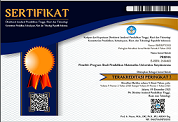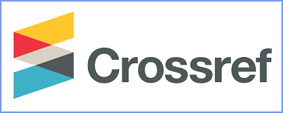Implementasi Proleco-DDR untuk Mengembangkan Kemampuan Profesional Guru SD dalam Pembelajaran Matematika di Kabupaten Ciamis
Abstract
Proleco-DDR bertujuan untuk mengembangkan pengetahuan profesional guru melalui implementasi jejaring professional learning community dengan menerapkan DDR. Penelitian ini bertujuan untuk mengetahui bagaimana pengetahuan profesional guru berkembang melalui penerapan Proleco-DDR di Kabupaten Ciamis. Penelitian ini merupakan penelitian kualitatif dengan pendekatan fenomenologi hermeneutik. Partisipan yang terlibat dalam penelitian ini berjumlah 48 orang yang terdiri dari guru matematika sekolah dasar di Kabupaten Ciamis. Berdasarkan hasil dan pembahasan dapat disimpulkan bahwa guru matematika sekolah dasar perlu meningkatkan kemampuan untuk berinovasi dalam proses belajar-mengajar melalui serangkaian penelitian guru tentang praktik profesional yang konstruktif dan produktif. Untuk mengembangkan pengetahuan profesional guru, kerangka implementasi Proleco-DDR dilaksanakan melalui mekanisme praktik reflektif, dialog argumentatif, penulisan naratif, dan hubungan collaborative-colleague. Selain itu, kerangka metapedadidaktik dan DDR merupakan perangkat intelektual dalam sistem aktivitas Proleco untuk jejaring sekolah dasar di Kabupaten Ciamis.
Keywords
Full Text:
PDF (Bahasa Indonesia)References
Butke, M. A. (2006). Reflection on Practice: A Study of Five Choral Educators’ Reflective Journeys. Update: Applications of Research in Music Education, 25(1), 57–69. https://doi.org/10.1177/87551233060250010107
Cochran-Smith, M., & Lytle, S. L. (1999). Chapter 8: Relationships of knowledge and practice: Teacher learning in communities. Review of Research in Education, 24(1), 249–305.
Darling-Hammond, L., & Sykes, G. (1999). Teaching as the learning profession : handbook of policy and practice. In The Jossey-Bass education series. ERIC.
Diaz-Maggioli, G. (2004). Teacher-centered professional development. ASCD.
Hargreaves, A., & Shirley, D. L. (2013). The global fourth way: the quest for educational excellence. In Choice Reviews Online (Vol. 50, Issue 09). Corwin Press. https://doi.org/10.5860/choice.50-5128
Killion, J., & Todnem, G. (1991). A Process for Personal Theory Building. Educational Leadership, 48(6), 14–17.
Little, J., & Anderson, J. (2016). What factors support or inhibit secondary mathematics pre-service teachers’ implementation of problem-solving tasks during professional experience? Asia-Pacific Journal of Teacher Education, 44(5), 504–521. https://doi.org/10.1080/1359866X.2015.1115822
Loucks-Horsley, S., Stiles, K., Mundry, S., Love, N., & Hewson, P. (2012). Designing Professional Development for Teachers of Science and Mathematics. In Designing Professional Development for Teachers of Science and Mathematics. Corwin press. https://doi.org/10.4135/9781452219103
Parsons, M., & Stephenson, M. (2005). Developing reflective practice in student teachers: Collaboration and critical partnerships. Teachers and Teaching: Theory and Practice, 11(1), 95–116. https://doi.org/10.1080/1354060042000337110
Procaccini, J. (2012). Professional Capital: Transforming Teaching in Every School by Andy Hargreaves and Michael Fullan . Journal of School Choice, 6(4), 515–517. https://doi.org/10.1080/15582159.2012.733288
Pultorak, E. G., & Association of Teacher Educators. (2010). The purposes, practices, and professionalism of teacher reflectivity : insights for twenty-first-century teachers and students. R&L Education.
Rodgers, C. (2002). Defining reflection: Another look at John Dewey and reflective thinking. Teachers College Record, 104(4), 842–866. https://doi.org/10.1111/1467-9620.00181
Silcock, P. (1994). The Process Of Reflective Teaching. British Journal of Educational Studies, 42(3), 273–285. https://doi.org/10.1080/00071005.1994.9974001
Spangler, G. A. (1987). Govier`s A Practical Study of Argument. In Informal Logic (Vol. 9, Issue 2). Cengage Learning. https://doi.org/10.22329/il.v9i2.2674
Stigler, J. W., & Hiebert, J. (2000). The Teaching Gap: Best Ideas from the World’s Teachers for Improving Education in the Classroom. In Journal of Curriculum Studies (Vol. 32, Issue 6). Simon and Schuster. https://doi.org/10.1080/00220270050167215
Suryadi, D. (2010). Metapedadidaktik dan Didactical Design Research (DDR): Sintesis Hasil Pemikiran Berdasarkan Lesson Study. Teori, Paradigma, Prinsip, Dan Pendekatan Pembelajaran MIPA Dalam Konteks Indonesia, 55–75.
DOI: https://doi.org/10.35194/jp.v11i2.2585
Refbacks
- There are currently no refbacks.
Copyright (c) 2022 PRISMA
Prisma Indexing :Â

PRISMA by UNIVERSITAS SURYAKANCANA is licensed under a This work is licensed under a Creative Commons Attribution-ShareAlike 4.0 International License.Based on a work at https://jurnal.unsur.ac.id/prisma.


1.jpg)








